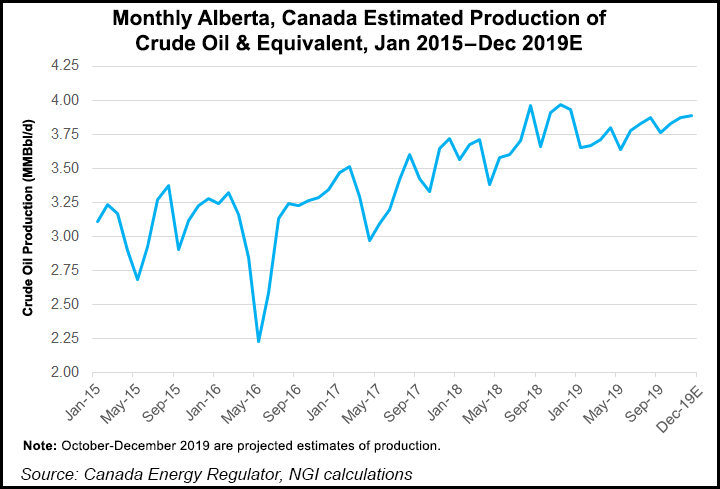Shale Daily | E&P | NGI All News Access
‘No Constructive Path Forward’ Dooms $15B Alberta Oilsands Project
Murky climate change policies and a shaky oil investment outlook have inflicted a C$20 billion ($15 billion) Canadian casualty, the Frontier Project for a 260,000-b/d oilsands mine in northern Alberta.

Vancouver-based Teck Resources Ltd. canceled the project late Sunday and withdrew its regulatory application, which awaited an unpredictable final decision for or against approval later this week by the federal Liberal government’s cabinet.
The Frontier mine’s fate remained hotly debated among Canadian leaders. The national Liberals voiced doubts. Alberta’s United Conservative Party provincial government called for the federal cabinet to match provincial and native support. Last summer, a joint review panel of the Alberta Energy Regulator and the Canadian Environmental Assessment Agency endorsed the project despite findings that effects on nature would be significant.
In a letter to national Environment Minister Jonathan Wilkinson that withdrew the bitumen scheme from the federal-provincial stalemate, Teck president Don Lindsay said, “It is now evident that there is no constructive path forward for the project.”
Lindsay wrote, “Global capital markets are changing rapidly. Investors and customers are increasingly looking for jurisdictions to have a framework in place that reconciles resource development and climate change, in order to produce the cleanest possible products.”
The Teck president told Canada’s environment minister that the framework “does not yet exist here today. Unfortunately, the growing debate around this issue has placed Frontier and our company squarely at the nexus of much broader issues that need to be resolved.”
Lindsay said, “The promise of Canada’s potential will not be realized until governments can reach agreement around how climate policy considerations will be addressed in the context of future responsible energy sector development. Without clarity on this critical question, the situation that has faced Frontier will be faced by future projects and it will be very difficult to attract future investment, either domestic or foreign.”
In a joint statement, Ottawa Wilkinson and Natural Resources Minister Seamus O’Regan said they agreed with Teck and leading industry groups “that all orders of government need a real plan for climate action now and to reach a net-zero [carbon emissions] economy by 2050…
“Canada will stay competitive in the global economy if our industries continue innovating with the best technologies in the world and if governments work together on a serious plan to protect the environment.”
In Alberta’s capital, Edmonton, Premier Jason Kenney called Teck’s project cancellation “a grave disappointment” that cost the country 7,000 jobs and C$70 billion ($52.5 billion) in royalties and taxes over the mine’s forecast 41-year lifespan.
“Weeks of federal indecision on the regulatory approval process and inaction in the face of illegal blockades have created more uncertainty for investors looking at Canada,” Kenney said. “Teck’s predicament shows that even when a company spends more than C$1 billion ($750 million) over a decade to satisfy every regulatory requirement, a regulatory process that values politics over evidence and the erosion of the rule of law will be fatal to investor confidence.”
© 2024 Natural Gas Intelligence. All rights reserved.
ISSN © 2577-9877 | ISSN © 2158-8023 |
